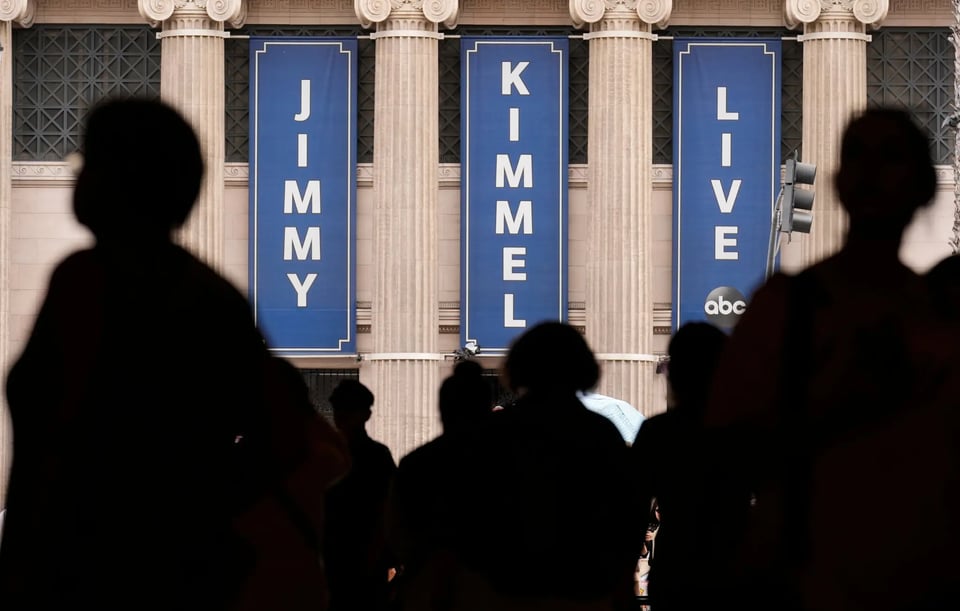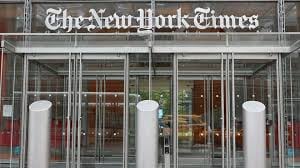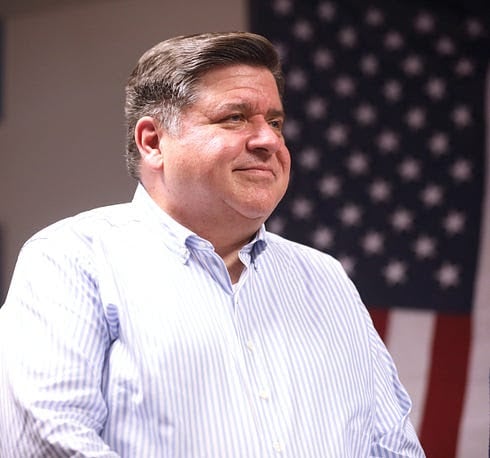Saturday, September 20,2025. Annette’s Roundup for Democracy.
The fight for free speech and free press continues.
Trump wrote on Truth Social.
"They should lose their Licenses for their unfair coverage of Republicans and/or Conservatives, but at a minimum, they should pay up BIG for having the privilege of using the most valuable airwaves anywhere at anytime!!!" "Crooked “journalism” should not be rewarded, it should be terminated!!!”
In Pressuring ABC Over Kimmel, Trump May Have Crossed a Constitutional Line.
The Supreme Court has distinguished bully-pulpit persuasion, which is permissible under the First Amendment, from coercion and threats, which are not.

The “Jimmy Kimmel Live” studio in Los Angeles this week.
In 1963, four years before Jimmy Kimmel was born, the Supreme Court drew a constitutional line. The government is free to encourage and persuade private entities to support its policies, the court said. But the First Amendment forbids the government from using coercion backed by threats of punishment to suppress speech.
That line has been tested by ABC’s decision to suspend Mr. Kimmel after the chairman of the Federal Communications Commission, Brendan Carr, criticized his commentary on the killing of the conservative activist Charlie Kirk.
It is not clear whether or how Mr. Kimmel’s suspension might lead to a First Amendment case against the government or what precise question it would pose. Mr. Carr appeared to threaten both the network and its affiliates with regulatory action, though his agency’s power is mostly over the licenses of local stations.
But constitutional scholars said Supreme Court cases over more than 60 years indicate that the Trump administration’s threats this week were in tension with the conventional understanding of what the Constitution allows.
Mr. Carr, speaking on a podcast on Wednesday, appeared to say his agency was ready to act.
“Frankly, when you see stuff like this — I mean, we can do this the easy way or the hard way,” he said. “These companies can find ways to change conduct and take action, frankly, on Kimmel, or there’s going to be additional work for the F.C.C. ahead.”
President Trump, speaking to reporters on Air Force One on Thursday, said hosts of late-night shows were overwhelmingly critical of him and their employers should pay a price. “I would think maybe their license should be taken away,” he said, apparently referring to the licenses held by stations affiliated with the offending networks.
The First Amendment does not constrain ABC, which is a private entity. It can air what it chooses.
But, as the Supreme Court ruled in 1963, the Constitution’s protection of free expression also prohibits the government from leveraging its power over private parties like the network to censor speech.
The court has continued to explore and reinforce the distinction between persuasion and compulsion, ruling just last year that even indirect threats from powerful regulators cross the constitutional line.
The 1963 case Bantam Books v. Sullivan involved a commission established by Rhode Island lawmakers concerned that young people might be reading obscene books. The commission sent notices to a wholesale book distributor in the state, listing disfavored publications and noting the commission’s “duty to recommend to the attorney general” violations of the state’s obscenity laws. The notices also said that lists of blacklisted books had been “circulated to local police departments” and that the distributor’s cooperation would “eliminate the necessity” of any referral for prosecution.
Still, the commission had no independent power to punish the distributor and retailers. All it did, it said, was try to persuade them to decline to sell immoral books.
Four publishers sued, and the Supreme Court ruled that the commission’s actions, though indirect and informal, had violated the First Amendment.
“People do not lightly disregard public officers’ thinly veiled threats to institute criminal proceedings against them if they do not come around,” Justice William J. Brennan Jr. wrote. “It would be naïve to credit the state’s assertion that these blacklists are in the nature of mere legal advice, when they plainly serve as instruments of regulation independent of the laws against obscenity.”
The Supreme Court reaffirmed the decision last year, citing it with approval and at length.
“Ultimately,” Justice Sonia Sotomayor wrote for a unanimous court whose composition remains unchanged, “Bantam Books stands for the principle that a government official cannot do indirectly what she is barred from doing directly: A government official cannot coerce a private party to punish or suppress disfavored speech on her behalf.”
That case flipped the politics of the current moment. It was brought by the National Rifle Association, which said a state official in New York had violated the First Amendment by encouraging companies to stop doing business with the group after the 2018 school shooting in Parkland, Fla.
A unanimous three-judge panel of the U.S. Court of Appeals for the Second Circuit, in New York, ruled against the N.R.A.
Judge Denny Chin, writing for the panel, acknowledged that government officials may not “use their regulatory powers to coerce individuals or entities into refraining from protected speech.
“At the same time, however,” he wrote, “government officials have a right — indeed, a duty — to address issues of public concern.”
The official’s actions were on the right side of the constitutional line, Judge Chin wrote. Key documents, he said, “were written in an evenhanded, nonthreatening tone, and employed words intended to persuade rather than intimidate.”
The N.R.A. appealed and was represented at the Supreme Court by the American Civil Liberties Union. “The fact that the A.C.L.U. is defending the N.R.A. here only underscores the importance of the free speech principle at stake,” David D. Cole, then the national legal director of the civil liberties group, explained at the time.
The case was at an early stage when it reached the justices, who were required to accept the N.R.A.’s version of the facts. (It later emerged that parts of the N.R.A.’s account were open to question.)
The factual disputes did not affect the court’s vehement legal conclusions.
“A government official can share her views freely and criticize particular beliefs, and she can do so forcefully in the hopes of persuading others to follow her lead,” Justice Sonia Sotomayor wrote for the court. “In doing so, she can rely on the merits and force of her ideas, the strength of her convictions and her ability to inspire others. What she cannot do, however, is use the power of the state to punish or suppress disfavored expression.”
The N.R.A. case involved Maria T. Vullo, a former superintendent of the New York State Department of Financial Services. Justice Sotomayor wrote that Ms. Vullo had “direct regulatory and enforcement authority” over New York insurance companies and financial service institutions.
That is a significant power, but it is not comparable to the chairman of a federal agency with vast authority over the national discourse, to say nothing of the president of the United States.
“Generally speaking,” Justice Sotomayor wrote, “the greater and more direct the government official’s authority, the less likely a person will feel free to disregard a directive from the official.”
The Supreme Court returned the case to the Second Circuit, which ruled against the N.R.A. in July on different grounds.
The Vullo decision illuminates the dispute over Mr. Kimmel’s suspension, said Robert C. Post, a law professor at Yale, noting that the Supreme Court had “recently and firmly announced” that government officials cannot rely on coercion to suppress disfavored speech.
“Yet, to all outward appearances,” Professor Post said, “that is exactly what is happening now as government regulatory bodies subservient to Trump threaten to crack down on those who oppose conservative views.”
The Supreme Court has said that government regulation of broadcasters, given the scarcity of the airwaves, can be more extensive than that of, say, the internet or newspapers. Mr. Carr alluded to that on Wednesday, saying of local stations that “they have a license granted by us at the F.C.C., and that comes with it an obligation to operate in the public interest.”
But none of that “can justify the F.C.C. trying to pressure ABC into suspending Kimmel,” Eugene Volokh, a fellow at the Hoover Institution at Stanford, wrote in a blog post on Thursday.
In another Supreme Court decision last year, Murthy v. Missouri, the majority dodged the question of whether the Biden administration had violated the First Amendment by urging social media companies to delete what the government said was misinformation about topics like the coronavirus pandemic and the 2020 election.
In that case, the court ruled that the challengers — Missouri and Louisiana, along with five individuals — had not shown that they were suffering the sort of direct injury that gave them standing to sue. Were Mr. Kimmel to sue, he might well overcome that hurdle but would have to prove that Mr. Carr’s statements were coercive threats and that ABC acted in response to them rather than independently.
In dissent in the social media case, Justice Samuel A. Alito Jr. wrote that the court should have should have ruled that the Biden administration was on the wrong side of the constitutional line.
“What the officials did in this case was more subtle than the ham-handed censorship found to be unconstitutional in Vullo, but it was no less coercive,” Justice Alito wrote. “And because of the perpetrators’ high positions, it was even more dangerous. It was blatantly unconstitutional, and the country may come to regret the court’s failure to say so.” (Adam Liptak, New York Times)
One more thing.
Judge tosses Trump’s $15B lawsuit against New York Times.

A federal judge threw out President Donald Trump’s $15 billion lawsuit against The New York Times, calling it an undignified public relations exercise meant to “rage against an adversary” rather than present a well-reasoned legal case.
“As every lawyer knows (or is presumed to know), a complaint is not a public forum for vituperation and invective,” U.S. District Judge Steven Merryday, an appointee of George H.W. Bush, said of Trump’s 85-page grievance-laden lawsuit. “A complaint is not a megaphone for public relations or a podium for a passionate oration at a political rally or the functional equivalent of the Hyde Park Speakers’ Corner.”
Merryday gave Trump’s attorneys 28 days to refile the lawsuit and ordered it to be limited to 40 pages, saying Trump must follow the rules requiring complaints to be clear and precise. He said the lawsuit, if it proceeds, must do so in “a professional and dignified manner.”
A spokesperson for Trump’s legal team said “President Trump will continue to hold the Fake News accountable through this powerhouse lawsuit ... in accordance with the judge’s direction on logistics.”
The scathing takedown by a Florida-based federal judge is not Trump’s first. U.S. District Judge Donald Middlebrooks, a Clinton appointee, in 2022 tossed a similarly sweeping lawsuit by Trump against Hillary Clinton and numerous other adversaries — and later fined him and attorney Alina Habba $1 million for what the judge said was a “completely frivolous” case.
Trump has often used civil lawsuits to deliver sweeping attacks on his rivals, later using his Truth Social platform to amplify the legal filings and declare them to be “powerhouse” arguments.
Merryday said that despite the “modicum of expressive latitude” afforded to lawyers in civil lawsuits, Trump’s complaint against the Times went way over the line. It careened between allegations about the “persistent election interference from legacy media” to “the halcyon days” of the news business to a “desperate need to defame” to defenses of Trump’s father, Trump’s wealth and his sprawling real estate empire.
Merryday noted that the complaint offered “repetitive, and laudatory (toward President Trump) but superfluous allegations.” (Politico)
If you want to read drivel, Trump’s empty lawsuit is here.
Good advice for Democracy.
Be Loud — For America By Governor JB Pritzker

I have spent the last few weeks addressing and preparing for a military invasion by the President of the United States. No, I’m not a soldier or a foreign adversary. I’m the Governor of Illinois, one of our nation’s largest and most prosperous states.
This is the reality we face, and it is not acceptable. Even though there is no emergency or insurrection, Donald Trump has put blue states that he considers his enemies in the crosshairs for political punishment. As we work to overcome his Medicaid and SNAP cuts, grow our economy despite his new tariff taxes, balance our budget, rebuild our roads, and help students learn, we must now face a new reality. We have to support our communities as Trump’s ICE agents run rampant on our streets with impunity and detain U.S. citizens—while at the same time navigating the ongoing threats of sending in the National Guard.
I am not surprised. Trump has held onto an obsessive hatred for Illinois since before his first term, and he’s been disparaging Chicago—the most American of cities—since long before he built Trump Tower Chicago. He knows our city is too great, too beloved, and too resilient to ever embrace a small-minded wannabe dictator like him. Everything Trump stands for upsets our collective Midwestern values of hard work, kindness, honesty and caring for our neighbors.
I could tell you how Chicago’s homicide rate has dropped by nearly 50 percent since the summer of 2021 and is not even in the top 25 most dangerous cities in the U.S; or how Illinois ranks in the top half of states for lowest violent crime rate and has invested more than $250 million violence prevention programs that actually work. I could tell you how Illinois ranks 6th nationally in per capita investments in our police force. And that even with all of this progress, we still have work to do. Indeed, that’s what we’re doing—every single day.
But we all know that Trump’s campaign to militarize Chicago isn’t about crime.
So the question remains: What is this about, and what are we going to do about it?
Chaos and destabilization are the means. Eroding our democratic institutions is his end-goal. He is looking to cause mayhem in the big cities of blue states to create an excuse to call in the military and lay the foundation for actions far more craven.
If your goal is to give tax breaks to yourself and your wealthy friends, then stripping millions of people of their healthcare and food assistance to pay for it makes sense. And if that causes the majority of the public to want to vote against your party, thwarting their will in the 2026 elections requires forceful intervention in the election process.
If your goal is to cement your power, then it’s rational to pardon your most ardent criminal supporters who have been convicted of carrying out violent acts on your behalf. They will be your civilian army.
If your goal is to cause as much chaos as possible, then punishing states that have protected their people from your policies—consequently obstructing your agenda—by sending in our National Guard makes sense.
To justify such rash maneuvers, Trump has claimed that states that protect immigrants are thwarting crime-fighting by doing so. Which is just nonsense.
Our laws protect our people. In Illinois, we have the Trust Act—signed into law by my Republican predecessor—which prevents state and local law enforcement in Illinois from assisting federal agents with civil immigration actions. This serves two purposes: First, we want local law enforcement officials to focus on fighting actual violent crime, while leaving federal immigration agents to enforce federal immigration laws. Second, we want ALL communities to feel comfortable calling law enforcement to seek help, report crimes, and cooperate in investigations—regardless of their immigration status.
We support non-profits on the ground who are leading the charge on Know Your Rights campaigns; providing legal services and other support services for immigrants and their families. Illinois proudly has one of the strongest and most impactful networks of advocacy groups supporting targeted communities in the country. In February, even Trump’s Border Czar Tom Homan acknowledged the impact of these campaigns.
But Trump has become increasingly brazen and deranged in his rhetoric and his actions—even going so far as to declare war against Chicago. No President should talk about Chicago like it’s a place to be conquered. And no President should talk about Americans like they are objects of his ire.
What Trump is doing and saying are un-American. That’s why we must all stand up and speak out. Be loud, for America.
He may attack the people of Illinois—but then what comes next? This is bigger than one state. Every day, I am hellbent on letting people know what is at stake. On the ground here, I am sharing whatever information we have about Trump’s nefarious plans with my fellow Illinoisans. I’m meeting with community violence intervention groups, immigration leaders, faith leaders, business leaders, small businesses and communities throughout Chicagoland, because all of us have a role in this fight.
Our country has survived darker periods than the one we are going through now—but that only happened because good people refused to stay silent. The attacks must end with Chicago. So I’m asking you, my fellow Americans across the nation: instead of being bystanders, be upstanders for our democracy.
Unlike Donald Trump, most Americans believe in the ideals our nation was founded upon. Now is the time to stand up for those noble ideals. (The Contrarian)
The Colbert collection.
Have fun.
Enjoy the weekend despite our great leader.
See you on Tuesday.